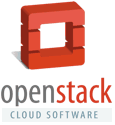OpenStack goes Grizzly with seventh release

The OpenStack community has made its seventh major release of the cloud software, named "Grizzly". The update brings almost 230 new features to the various aspects of the IaaS (Infrastructure as a Service) platform, with 517 contributors and 7620 merged patches. Changes to the core OpenStack Compute (also known as Nova) components add support for managing distributed clusters as "Cells" and a new "NoDB" architecture reduces reliance on a centralised database. There is also wider support for ESX, KVM, Xen and Hyper-V hypervisors, and new functionality for base metal provisioning of nodes, shared storage protocols, and hot add/remove support for network devices.
The Object Storage (Swift) component of OpenStack now lets cloud operators apply quotas to control the expansion of their object storage and lets them perform bulk operations over large clusters. Cross-origin resource sharing has been added to allow browsers to directly connect to resources in the storage cloud and improve the scalability of web applications which use the object storage as a content resource. Block Storage (Cinder), now in its second full release, has acquired an intelligent scheduler to manage storage allocation based on workload and has added drivers for backend storage including Cep/RBDh, EMC, HP, IBM, NetApp, and Red Hat's Gluster.
Networking (Quantum) in Grizzly has seen its supported technology grow from Open vSwitch, Cisco UCS/Nexus, Linux Bridge, Nicira, Ryu OpenFlow and NEC OpenFlow to now include Big Switch, Hyper-V, PlumGrid, Brocade and Midonet. Improvements in scalability have been achieved by distributing L3, L4 and DHCP services across multiple servers. A new framework and API for Load Balancing as a Service (LBaaS) has been included to allow further development on this theme.
The Dashboard (Horizon) has better multilingual support with various user experience improvements, and more OpenStack features, like Networking and the LBaaS features, are now surfaced in the cloud. The Grizzly Dashboard is compatible with the previous, Folsom, release of OpenStack, allowing Folsom users to use the new dashboard without engaging in a migration to Grizzly.
OpenStack Identity (Keystone) has adopted a new token format, which has improved performance and allows tokens to be authenticated by clients offline. There are also improvements to multi-tenant support for groups, impersonation, role-based access, and more delegation capabilities. Even the Image Service (Glance) got improvements to make images easier to discover and quicker to retrieve. Further details of all the improvements in OpenStack 2013.1, Grizzly, can be found in the release notes.
For those interested in how the community developed Grizzly, Bitergia have published an analysis of the Grizzly cycle. It shows that the project is no longer dominated by Rackspace. Red Hat, for example, has 15-20 people involved in OpenStack, and was top corporate committer with over 1854 commits; Rackspace made 904 commits, and IBM made 895. An overview of the statistics provides a view in context.
The next step for OpenStack will come with the planning for the next release, Havana, which will take place at the OpenStack Summit running in Portland, Oregon from 15 to 18 April. Havana will see two projects which were incubated in Grizzly – Ceilometer, a centralised metering and monitoring system for data, and Heat, a template-based orchestration layer – integrated into the core system for the October 2013 release.
OpenStack's source code is available from the Grizzly home page and the project's GitHub repository and is licensed under the Apache 2.0 License. Packaged distributions of OpenStack Grizzly are expected to become available over the coming weeks and months.
(djwm)








![Kernel Log: Coming in 3.10 (Part 3) [--] Infrastructure](/imgs/43/1/0/4/2/6/7/2/comingin310_4_kicker-4977194bfb0de0d7.png)

![Kernel Log: Coming in 3.10 (Part 3) [--] Infrastructure](/imgs/43/1/0/4/2/3/2/3/comingin310_3_kicker-151cd7b9e9660f05.png)








